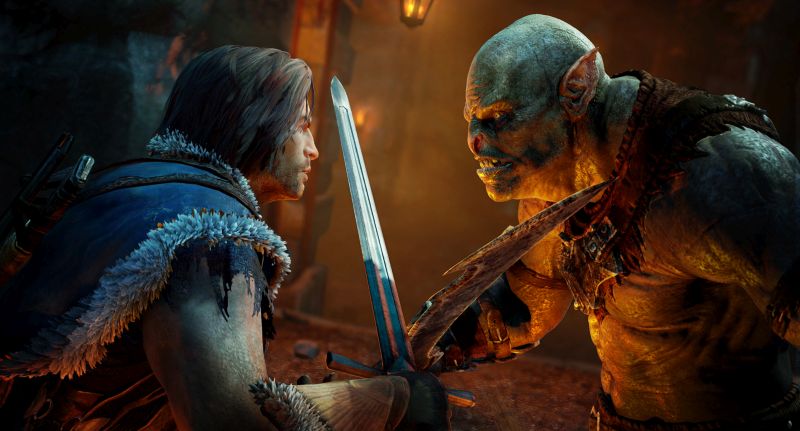Destiny’s disappointing lack of innovation left many soured by the empty promise of next-generation gaming. Why did a game, so hyped and costly end up being a monotonous grind-fest with almost no semblance of story? While Destiny wasn’t the game many had thought it would be (it was essentially a tarted-up MMO), Middle-earth: Shadow of Mordor is. The reviews are in and it turns out that Shadow of Mordor is one of the best, and possibly funnest game of 2014. Here’s what the experts have to say:
No ad to show here.
IGN’s Dan Stapleton has nothing but love for Shadow of Mordor, saying “it stands out from other open-world action games by putting a great new layer on top of the trail that Batman (Arkham Asylum, City) blazed. Controls are tight, with Stapleton pointing out that the games protagonist, Talion, controls like Legolas and Batman combined. Shadow of Mordor has a neat enemy progression system on top of its exciting combat: “Uruks have an internal power struggle for rank, and you can interrupt their duels, feasts, hunts, and more to pick fights and kill off Uruk captains and ultimately the powerful Warchiefs. Each captain has his own randomized strengths and vulnerabilities, so every fight is at least a little different.”
Stapleton also highlights the gameplay elements, such as mind-control and how losing actually matters in Shadow of Mordor. As a special bonus for the PC master race, the ultra-high graphics setting on the PC version of Shadow of Mordor uses over 6GB of texture memory, delivering an incredible graphic experience. IGN scored Shadow of Mordor 9.3/10, calling it “amazing”.
Phillip Kollar, a scribe from Polygon spoons on the praise. “Middle-earth: Shadow of Mordor provides a clearer road map for the next generation of triple-A games than anything that has come previously.” Kollar says how developers Monolith Productions has built one of the best “living” open-world games of recent times, with a strong plot that benefits from its dynamically generated content. Plot’s important, as disappointed Destiny fans will tell you. Shadow of Mordor also adds personality to the foes, with Kollar going as far as to call them “smart”.
This all stems from the Nemesis System: “Rather than set you up with specific, pre-determined bosses to take down, the game emulates the Uruk chain of command, placing Orcs with randomly generated names, strengths, weaknesses and personality traits into various positions of power.” This leads to players forming a sort of relationship with each boss or mini-boss. Moment-to-moment gameplay is especially satisfying and Talion is equipped with bows, daggers and swords, making it easy for the player to engage in stealth or melee combat. Ultimately, Shadow of Mordor is “that ultimate rarity.” Polygon scored it a 9.5/10.
Gamespot’s Kevin VanOrd provides a more balanced review, saying how Shadow of Mordor has “an erratic story” and that the best moments don’t happen until the second-half of the game. VanOrd is referring to the Uruk mini-control aspect, which means controlling Orc captains and influencing the arc of the game. As for the story: “the incomplete storytelling, combined with a series of tepid final encounters, unfortunately softens the sting of the conclusion’s slashing and gnashing.”
Still, the single-button scaling of structures (like Assassin’s Creed) is heaps of fun, but is hampered by “a lack of precise movement that makes certain simple actions more trouble than they’re worth, clumsy camera angles, and animation quirks that turn close-quarters battles into awkward, jittery dances.” Overall though, VanOrd is a fan, saying how fantastic the sound design is, how visceral the combat can be and that the Nemesis System is “fun to mess with.” Shadow of Mordor scores a healthy 8/10.
It’s Christ Carter of Destructoid who offers the most damning review, saying how the games plot is too “generic”. While combat and exploration are “solid”, Carter feels as if the whole thing has been ripped straight out of Batman: Arkham Asylum. Carter also mentions how the “over-hyped” Nemesis System gets boring, quickly. “Yes, the names are randomized and some of the appearances look different enough, but after an hour of seeing it in action everything blends together. Orcs don’t have unique personalities per se, just unique weaknesses (like insta-stealth kill vulnerability, or a weakness to ranged attacks) and generic parameters. Fights against 90% of the captains, warchiefs, and named enemies in the game feel exactly the same.” Carter ends by saying that Shadow of Mordor isn’t a bad game, “it just feels far too repetitive for its own good.” Destructoid scores it a 6/10.
